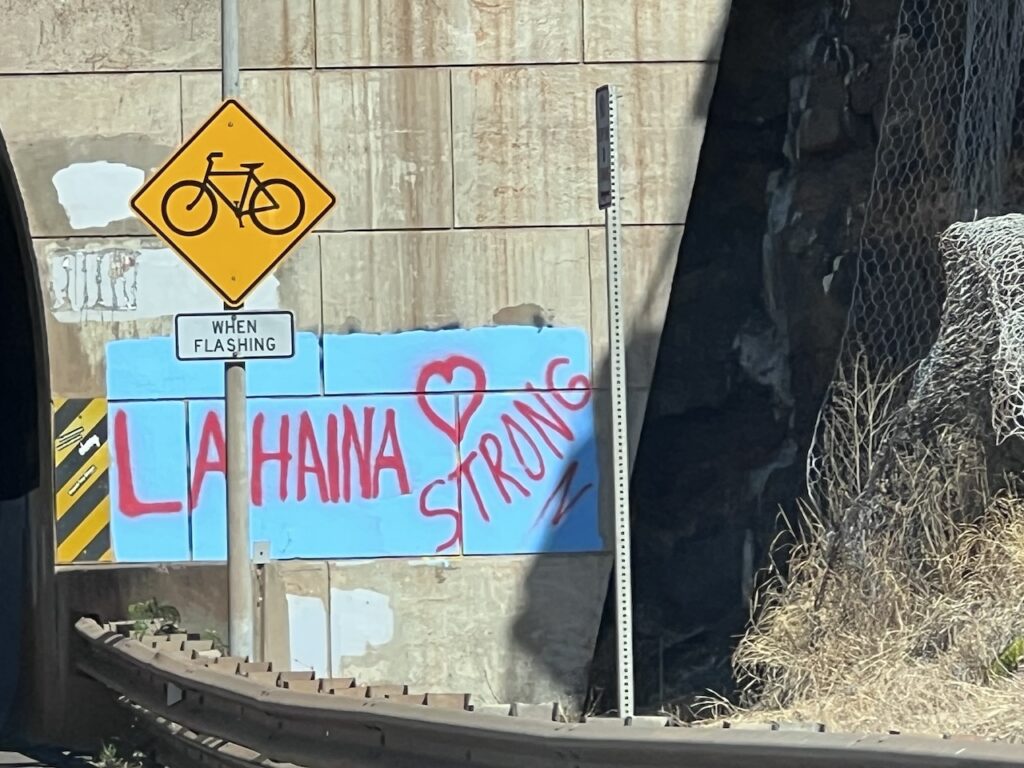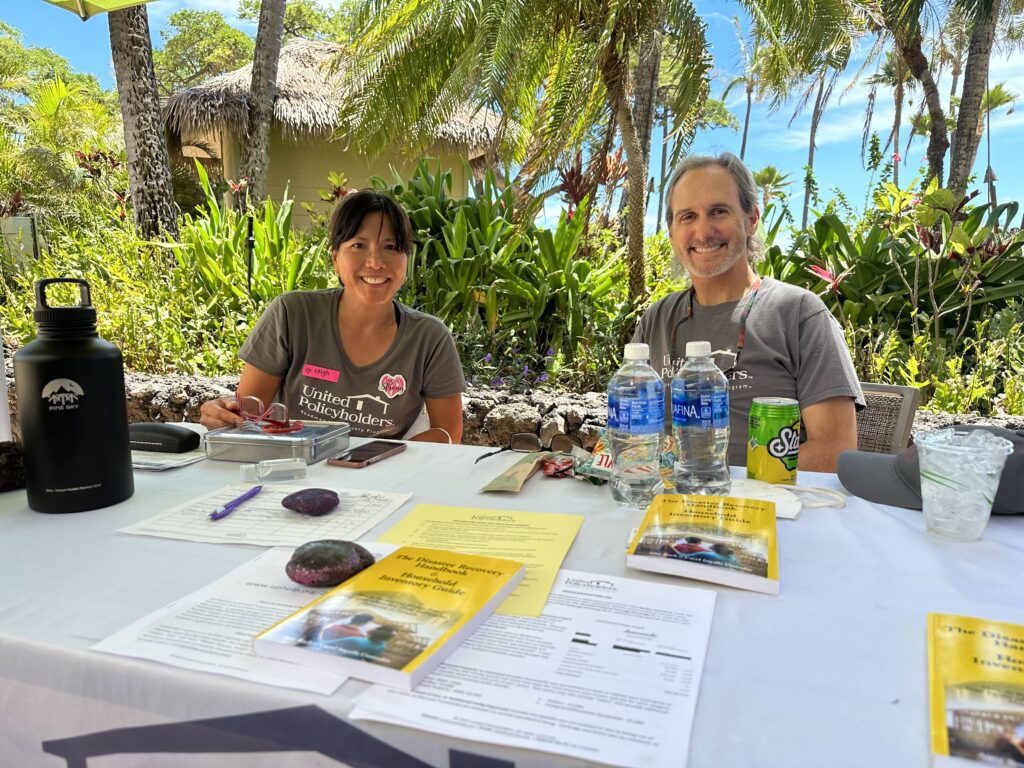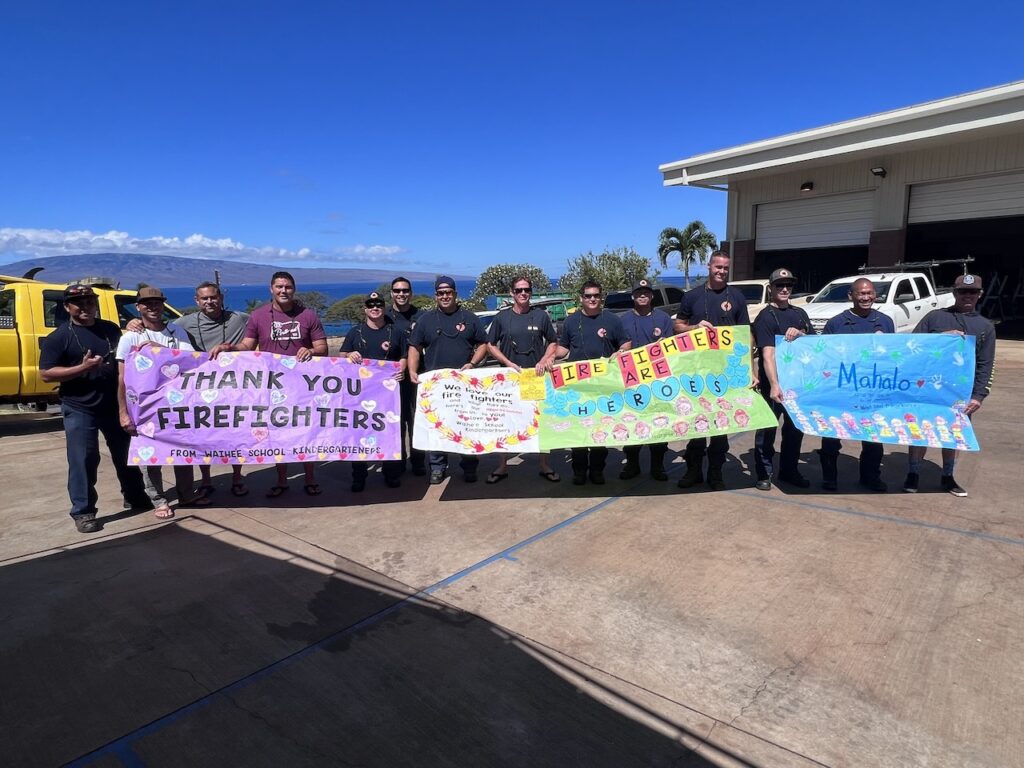Survivors Speak: Ten Days in Lahaina
by David Gurley, 2017 Tubbs Fire Survivor
Driving along the idyllic West Maui coast on a characteristically stunning day in early September, all looked as beautiful as ever.
As I crested the hill on the south of end of Lahaina, John Lennon’s ‘Imagine’ was playing on the radio. And I began to weep, as the dust screens and the sentinel police cars along the road came into view.

There is a commonality of the conditions, the effects and the profound loss, between each fire location, whether in Maui or Colorado or northern California. The ‘Burn Zone’ always looks like a war zone. A large area where a vicious enemy has chased the inhabitants from their homes, ravaging their lives and consuming all they have created, built, collected, inherited. Indiscriminately absenting a church, a home, a playhouse, a toy, as if to consciously inflict additional harm with the simple confusion of inconsistency. And – of course – taking the lives of the defenseless, leaving the others to a different, torturous future.
When I parked the car and opened the door, the odor of burnt dirt caught me first. It is the same in and around every Burn Zone. The acrid stench of unbridled consumption, as if the only effective adversary to this enemy is the Earth itself….
 On day one, I met my UP counterpart, Leigh. She’d grown up on the island, and now lived with her family in Colorado. I had come to Maui with a keen sensitivity to my being an outsider, a Mainland haole. I hoped that that awareness, and being teamed up with a partner born and raised the island, might lend me some small credibility with the people that would visit our table, seeking assistance – and reassurance – relative to their insurance coverage. Or utter lack thereof.
On day one, I met my UP counterpart, Leigh. She’d grown up on the island, and now lived with her family in Colorado. I had come to Maui with a keen sensitivity to my being an outsider, a Mainland haole. I hoped that that awareness, and being teamed up with a partner born and raised the island, might lend me some small credibility with the people that would visit our table, seeking assistance – and reassurance – relative to their insurance coverage. Or utter lack thereof.
Our table was located on the patio outside a large group of conference rooms at the HyattRegency Ka’anapali. An exceptionally strange intersection of circumstance, to find myself at such a stunning and prestigious resort, to counsel policyholders on such a devastating disaster.
Under the bright sunshine and blue sky, the breezy palm trees and singing birds and smell of the ocean, people came to the Disaster Recovery Center to register with FEMA, SBA, The Red Cross, The United Way, The Salvation Army. Seeking solace, direction, hope – and a bit of cash.
Sadly, when they emerged from the conference room, they often held the appearance of being frustrated, and – ofttimes – simply lost. A few would see us across the patio, and come to inquire as to what, if anything, we might possibly offer. ‘United Policyholders,’ most would say, ‘sounds like you’re an insurance company?’
We would immediately clarify that we both are fellow-survivors – fellow Policyholders – of our own past Wildfire events, with no involvement of any sort in the insurance industry or with any insurance company.
And, almost invariably, they would arise from our table twenty-, forty-, sometimes ninety minutes on, with a slightly more visible sense of agency, a bit of lightness, having been warmly welcomed into this dubious and unfortunate community of Fire Survivors.
On that first day, a young woman staying at the hotel with her husband, four boys and four dogs, after a long and involved conversation about their insurance, their jobs, their boys and their dogs, began to cry. “Thank you so much for being here,” she sobbed. “You are the first person in a month since the fire to give me anything close to a sense of Hope.” I wept, too.
On day two, instead of waiting for them to approach, we began to actively collect people as they emerged from the Federal conference room, with the simple question, “Did you get what you need?”
Often, they would look simply incredulous, and I would offer them a seat, an ear, a shoulder. Commonly, people would say, “I just wanted – I just needed – someone to say, ‘I get it.’”
Sympathy’s great, but Empathy Rules….
By Wednesday, Leigh’s on-island friendships had connected her with an attorney and law professor from San Francisco also licensed in Hawaii, who’d grown up on Maui. She’d asked if we might come for a meet-n-greet with the firefighters of the Maui Fire Department – Lahaina Station 3. Nothing formal. Just to say hello and introduce them to the UP organization and the support we offer.
 When we arrived, most of the eighteen firefighters who’d lost their homes in the fire were there to meet us. I was asked ‘to say a few words on the process.’
When we arrived, most of the eighteen firefighters who’d lost their homes in the fire were there to meet us. I was asked ‘to say a few words on the process.’
And the familiar spiel rolled out. Certified policy copies. Binders. Receipts. A.L.E. Payouts. Not signing anything. Each tidbit a piece of critical information that fades softly into the background of, “You all have the blessing of having a job – and a family – at the Firehouse that know just where you’re at and can give you a hug when the darkness returns. And – the curse – of having a place you have to be – to show up and perform – regardless of how you’re doing or feeling.”
I noticed a few of these fine young men beginning to tear up at being truly seen for the special devastation they’d endured, and were still enduring, as Firefighters completely overwhelmed by this surprise attack on the town and the people they’ve sworn to protect.
When my part was complete, we unfurled murals of thanks from local elementary school students. A show of the undying admiration of these wonderful little people for heroics and bravery they’ll hopefully never truly understand.
Over the next five days, we fielded calls and visits from an assortment of these young men, these pillars of the Community, who know how to make the impossible happen, but are – like us mere mortals – left confused and bewildered when trying to understand an insurance policy. The policies on which rest their ability to recover their belongings, their homes, their lives.
On day six, Leigh learned of a new community center on ‘the other side’ called the Kāko’o Maui Center, set up by the Council for Native Hawaiian Advancement to assist Hawaiians with Fire recovery efforts. We were asked to visit with them, and to sit with and speak to their clientele.
On Monday (Day 8), I went to the Kāko’o Center. My day was quiet, but meeting the staff was impactful for me, personally. I’d been trying to spread the word to Hawaiians who’ve for many years expressed suspicion and resentment towards the U.S. Government and other outsiders for their losses of culture, dignity, land, and income. “You don’t have to trust the Government, but don’t leave the money on the table…,” was the message.
Sitting at the Center, in the company of the Hawaiian staff, with a wholly non-commercial, totally supportive objective, helped me share the message with these critical members of the Hawaiian Community.
Indeed, late the next day, I received an inquiry from the Kāko’o Center management as to whether I might spend some time with two Elders of the Community – the Aunties – before my Thursday departure. The term ‘Aunty’ on the Island is one of great reverence for Elder women, and one to which, thankfully, I’d been introduced early on.
I was touched and deeply moved at having been sought out, to provide advice and guidance to these women of such importance to Lahaina and to the Island.
Wednesday (Day 10) was my last spent at the Lahaina Disaster Recovery Center. The Hawaiian Medical Council was distributing cash assistance to all Community members in need, which brought many of the people we’d met back to the Center. I was so glad to have the few goodbyes, and brokenhearted to be leaving so much yet to accomplish.
Nonetheless, I left early for my meeting at the Kāko’o Center. I was introduced to, and sat down with the Aunties, at one of the Center cubicles.
Ellen shared with me the coverage values of her policy, and that her husband had set up the insurance on their 1972 Lahaina home prior to his death in 2021. And she began to weep as she said she had no idea what to do now…. “My late husband took care of all of this. I just paid the bills,” she said through her tears.
Slowly, she went on to say that her insurance company had paid her less than half of the policy amount on her home of the past fifty years, and seemed to be encouraging her to accept the payment as a final settlement of her claim.
I felt again the familiar disbelief that in this tropical paradise, in one of the hottest, most expensive housing markets on the planet, this Elder widow was being so poorly treated. And yet, the industry’s Prime Directive persists: Pay As Little As Possible.
We spent about ninety minutes reviewing the UP process and guidance materials, and the tips and tricks collected from Fire Survivors over the organization’s thirty-year history.
When we rose from the table together they each embraced me with a slightly lighter, easier smile, a deep hug, and a tearful “Thank You.” I left the Center feeling awed that my own 2017 disaster left me with something unique to share with this exquisite Lahainatown Community.
This guest blog is written by 2017 Tubbs Fire Survivor David Gurley. David is a Team UP volunteer deployed to Maui for 10 days. On the island, David offered Maui Fire Survivors empathy and UP’s first steps guidance at Disaster Recovery Centers, and survivor-facing meetings and events.
